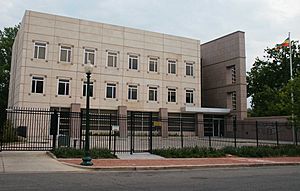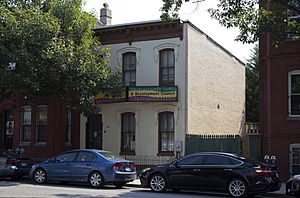Ethiopians in Washington, D.C. facts for kids
The Washington, D.C. metropolitan area is home to a large community of Ethiopian Americans. In fact, the Ethiopian Embassy once said this was the biggest group of Ethiopians living outside of Africa!
Contents
A Bit of History
Ethiopians started moving to Washington, D.C. after a big change happened in their home country. In 1974, a group called the Derg took over, and the Emperor of Ethiopia Haile Selassie was no longer in charge. This led many Ethiopians to seek new homes, and D.C. became a popular choice.
In the 1980s, many Ethiopians settled in a neighborhood called Adams Morgan. This area became a busy center for Ethiopian businesses. But by the mid-1990s, rent in Adams Morgan became very expensive. So, many Ethiopians started moving to the U Street area instead.
Around 2004, there was a push to officially call the U Street area "Little Ethiopia". People wanted this because Washington, D.C. is the capital of the United States. However, this idea didn't become official. At that time, there were actually more Ethiopians living in Alexandria, Virginia than in D.C.
In 2004, the Mayor of Washington, D.C. signed a law called the DC Language Access Act. This law made sure that government services were available in five languages other than English, including Amharic (the official language of Ethiopia). Ethiopian community members were very involved in getting this law passed.
Who Lives Here: Numbers and People
It's a bit tricky to know exactly how many Ethiopians live in the Washington, D.C. area.
According to the 2010 U.S. Census, there were about 30,000 Ethiopian immigrants in the D.C. area. This was about 20% of all Ethiopian immigrants in the entire country. However, some Ethiopian community groups, like the Ethiopian American Constituency Foundation, believed this number was too low. They thought the real number was probably over 100,000.
One local business owner, Yeshimebeth T. "Mama Tutu" Belay, even estimated that the population in the wider D.C. area was around 250,000 in 2010! Other estimates have been lower, but many sources agree that a very large number of Ethiopians live here. For example, a book called Washington 101 suggests that about 200,000 Ethiopians live in the D.C. metropolitan area.
The 2000 U.S. Census also reported about 15,000 Ethiopians in the D.C. area. But again, the Ethiopian embassy and experts who study immigration believed the number was closer to 200,000 even then.
You'll also find a big Ethiopian community, with many restaurants and businesses, in Silver Spring, Maryland.
Little Ethiopia, Washington, D.C.
Little Ethiopia is a special business and cultural area within the Shaw neighborhood of Washington, D.C. It's mainly located around 9th and U Street Northwest. This spot is famous for having many Ethiopian businesses and residents.
Since the 1980s, Ethiopian business owners have been buying properties in Shaw, especially near Thirteenth and Ninth Streets. This area has become very popular, even with people who aren't Ethiopian. A restaurant owner named Tefera Zwedie said that back in 2000 or 2001, it was rare to see non-Ethiopians in their restaurants. Now, he says, 95 percent of their customers are not Ethiopian!
The delicious Ethiopian food has become a big reason why locals and tourists visit Shaw. This growth of Ethiopian businesses has really helped the area. Because of this, some members of the Ethiopian American community tried to get the city government to officially name the block "Little Ethiopia." However, this idea faced some opposition from other Shaw residents. They were worried that an official name might make the area feel separate from the historically African-American Shaw neighborhood.
Where Ethiopians Live: Geography
As of 2000, Ethiopian communities can be found across Washington, D.C., Virginia, and Maryland.
In Washington, D.C., you'll find Ethiopians living in neighborhoods like Adams Morgan, Brightwood, and Columbia Heights. As mentioned, there's also a "Little Ethiopia" area in Shaw.
In Virginia, Ethiopian communities are in places like Alexandria, Arlington County, Fairfax, Fairfax County, and Falls Church. Within Fairfax County, many Ethiopians moved to Annandale, Springfield, and Vienna. Some people even call the Ethiopian community in Alexandria "a second unofficial Little Ethiopia." Around 2006, as housing prices went up, some Ethiopians moved further out to Woodbridge (in Prince William County) and Sterling (in Loudoun County). By 2010, some Ethiopian businesses had also opened in Skyline, Falls Church.
In Maryland, Ethiopians have settled in Montgomery County and Prince George's County. In Montgomery County, you'll find communities in Silver Spring and Takoma Park. In Prince George's County, they live in areas like Greenbelt, Clinton, District Heights, Fort Washington, Oxon Hill, and Upper Marlboro.
Community Organizations
The Ethiopian community in the D.C. area has several important organizations that help its members.
The Ethiopian Community Center, Inc. (ECC), located in Washington, D.C., was started in 1980. Another important group is the Ethiopian Community Development Council (ECDC), based in Virginia. The ECDC works to improve the community's social and economic well-being, promote Ethiopian culture, and help refugees settle in. For example, in a nine-year period ending in 2011, the ECDC gave out nearly $4.5 million in loans to 700 people who wanted to start their own businesses. The ECDC was founded in 1983.
The Ethiopian American Constituency Foundation (EACF), which encourages Ethiopians to get involved in politics, was created in 2003. This group also supported the idea of officially recognizing "Little Ethiopia" in Shaw. Another organization, Ethiocorps, started in 2004. It helps Ethiopian Americans from the D.C. area volunteer their time and skills in Ethiopia.
The Embassy of Ethiopia, Washington, D.C. also serves as an important resource for the community.
Jobs and Businesses
The Ethiopian community in the D.C. area is very active in business. In 2011, the Ethiopian Community Development Council reported that there were at least 1,200 businesses owned by Ethiopians across Washington, D.C., Northern Virginia, and Maryland.
You'll find many Ethiopian restaurants owned by Ethiopians, as well as other types of restaurants. In 2011, "Mama Tutu" Belay noted that many Ethiopian restaurants had opened in the Petworth area of D.C., Arlington County, Virginia, and downtown Silver Spring, Maryland.
As of 2013, there were also about 25 doctors of Ethiopian and Eritrean background in the wider Baltimore-Washington area. Many Ethiopians also own travel agencies, taxi companies, and parking garages. In 2010, it was common for Ethiopians to work as taxi drivers and parking attendants.
The United States offices for Ethiopian Airlines are located in Alexandria, Virginia.
News and Media
The D.C. area has its own Ethiopian newspapers, like Ze Ethiopia.
The Ethiopian Yellow Pages is a large phone book published in Alexandria, Virginia, with its main office in Shaw, Washington, D.C. It has over 1,000 pages of information! As of 2011, Yeshimebeth T. "Mama Tutu" Belay is the publisher, and her husband Yehunie Belay helps her. "Mama Tutu" Belay started the publication around 1994 by gathering lists of local businesses.
In 2007, there were plans to create an Ethiopian television network in Alexandria.
Faith and Beliefs
Because there are many Ethiopian and Jewish people in Washington, D.C. and Silver Spring, the greater D.C. area is home to a good number of Beta Israel (who are Ethiopian Jews). Most Ethiopians in the area are also Orthodox Christians.
Fun Activities
The Ethiopian Expo is a yearly event held in Washington, D.C. It's organized by "Mama Tutu" Belay and is a great way to celebrate Ethiopian culture.
Stories and Books
The novel The Beautiful Things That Heaven Bears by Dinaw Mengestu tells the story of an Ethiopian person who moved to Washington, D.C. to seek political asylum.
Famous People
- Yehunie Belay (a singer)
- Tamagne Beyene (an entertainer)
- Nebiyu Eyassu (an author and journalist)
- Kelela (an R&B singer and songwriter)
 | Delilah Pierce |
 | Gordon Parks |
 | Augusta Savage |
 | Charles Ethan Porter |



